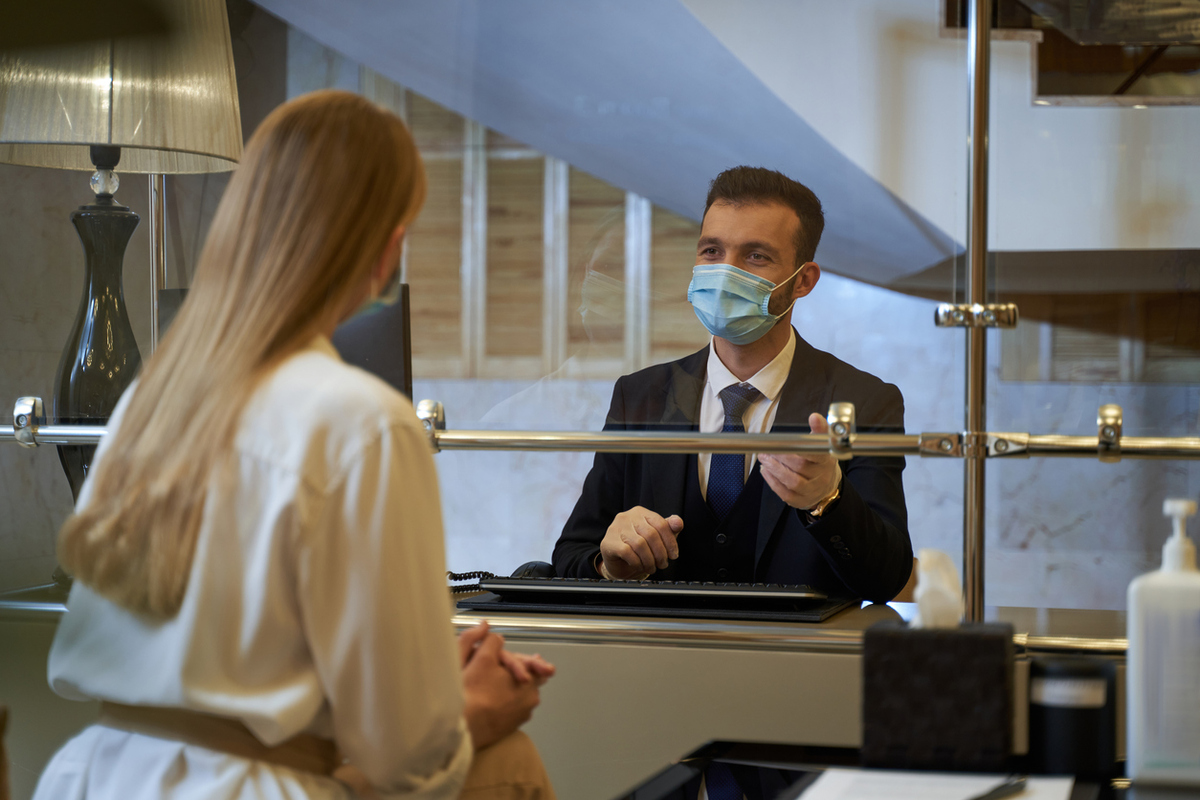Touch-free check-in
Last updated: November 4, 2020

How technology is keeping us safe during check-in as hotels find new ways to welcome guests...
As the impact of the Covid-19 pandemic is felt across the hospitality industry, hotels are looking for new ways to keep guests safe throughout their stay. Contracting coronavirus from another person remains by far the most likely route of infection. Hotels will therefore be adapting those occurrences where guests encounter other people – particularly at check-in.
Coronavirus is spread through the air via invisible respiratory droplets that are dispersed when an infected person sneezes or coughs. Transmission is lower with physical distancing of one metre or more between people, as a study published in The Lancet determined. Accordingly, at check-in, hotels will be trying to limit the need to have any contact with other guests and staff. When contact is necessary, extra distancing and sanitisation procedures should be in place.
Although the extent to which the virus can be contracted via contaminated surfaces is not fully known, experts advise exercising caution. One study, published in the New England Journal of Medicine found that the CoV-2 virus could survive on cardboard for up to 24 hours and up to two to three days on plastic and stainless-steel surfaces.
During check-in, hotels will be looking to limit the number of items touched by guests; such as doors, cash and paper. Where contact is inevitable (when checking passports/IDs as part of guest check-in), operators should maintain a safe social distance.
Before check-in
A hotel’s plan to reduce transmission should begin before a guest even enters the hotel. UK Hospitality advises hotels to email guests an information pack that reiterates the rules prior to arrival. This may also be available on the hotel website or through their listing on RightRooms. Many hotels will have automatic sliding doors, limiting the need for guests to touch a surface. There may be staff wearing personal protective equipment (PPE), to open and close the doors for guests. Some hotels, such as Jurys Inn, say they have stopped providing concierge luggage assistance at this time, to limit contact with staff.
Millennium Hotels say they may conduct temperature checks when guests first enter the property. All hotels, though, should have hand sanitiser stations in lobbies and communal areas, in line with WHO advice.
During check-in
RightRooms spoke to hotel chain Jurys Inn & Leonardo Hotels. Like many venues, they are operating a ‘minimum touch’ check-in procedure. This will include:
- Floor markings showing where to stand at reception; to maintain social distancing guidelines
- Protective screens at all reception desks
- Encouraged use of self-check-in kiosk screens at some locations
- A cashless operation – guests will only be able to pay by card
- Sanitisation of the check-in area and credit card terminal before the next guest’s use.
Digital keys
Pre-Covid, the use of contactless check-in was adopted with a somewhat piecemeal approach. Since the Covid-19 outbreak, we have seen an acceleration in the use of technologies that allow guests to complete procedures such as check-in digitally.
The Hilton hotel group was ahead of the curve. The global chain is now promoting its Hilton Honors App, released in 2014, more widely. Starting at 6am on the day before arrival, this mobile app allows guests to check-in and use their device as a digital key without having to visit the front desk. A digital key uses the Bluetooth function on a smartphone. Guests simply hold up their phone near the door lock to open their room. This digital key negates the need for a physical key that staff would have to pass to guests. Where a digital key is not an option, hotels such as Marriott will be frequently sanitising key cards with hospital-grade disinfectant.
Choosing your room
Some mobile applications and self-check-in kiosks, such as The Hilton Honors or NH’s FastPass allow guests to choose a room.
Because of social distancing measures, many hotels are encouraging guests to use the stairwell rather than lifts to access their rooms. The function to choose a room may allow guests to choose one on the ground or first floor, to avoid long walks up the stairs – particularly suitable for guests with mobility difficulties.
Useful links Find up-to-date guidance on travel, safety, Covid-19 research and more.
RightRooms believes all information to be correct at time of going to press. As guidance, research and facts around Covid-19 are changing constantly, the information provided here is for general information only and does not constitute professional advice. Please check with venues, locations and attractions before travelling.
